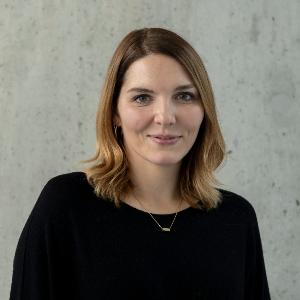An eye on the present – A professorship with a focus on the book market
26 Mar 2024
Since March 2023, Erika Thomalla has been conducting research into literary production, collaboration and digital book culture at LMU’s Centre for Book Studies.
26 Mar 2024
Since March 2023, Erika Thomalla has been conducting research into literary production, collaboration and digital book culture at LMU’s Centre for Book Studies.
Born and bred in Munich, Erika Thomalla was fortunate enough to be able to return to her native city following spells in Weimar and Berlin and periods as a visiting researcher in the USA. Her new position at the Centre for Book Studies made her return particularly exciting: “There are obviously close links to German studies, but there is also a focus on everything to do with literary practice and the business of literature – i.e. bookselling and publishing.” Launched in 2018, the center initially had more of a historical focus. “But my professorship was created to also bring the present day and the digital book culture more strongly into focus in research and teaching,” Thomalla explains.

Erika Thomalla is the first Professor of Book Studies/Digital Book Culture at LMU Munich. | © LMU
With a background in media studies, singing, music theater and German studies, the professor enjoys working on seminars with a focus on research and topical issues, keeping her finger on the pulse of the world of literature. In the summer semester, she and her students zoom in on the function, history and present-day practice of literary prizes. In another seminar, students develop a podcast on the subject of literary business. In past semesters, they have reviewed bestseller lists and addressed the topic of self-publishing – “Still a relatively sparsely researched issue,” Thomalla notes, “but one that is gaining in importance on the book market.”
The professor sees it as vital to keep an eye on current trends such as these and adopt a hands-on approach to her work, which includes collaboration with experts from the book industry. “In Germany, there are very few universities that study issues relating to the book industry,” Thomalla says. “Munich’s strong focus on practical aspects sets it apart. We work together with many local publishers, where students can gather hands-on experience. Such close links to practitioners are rare in higher education.”
The conditions surrounding literary production are one thing Erika Thomalla never leaves out of her research projects. Her doctoral thesis on the history of publishing focused on the question: How was literature used in the 18th and 19th centuries to push through certain cultural policy issues? “The history of publishing and bookselling obviously has an important part to play,” she says. “I have always been interested in these aspects of literature: seeing books not just as esthetic products divorced from social, economic or political conditions, but always seeing them in context.”
The German Research Association (DFG) network Praktiken der literarischen Kollaboration (Literary Collaboration Practices), which Thomalla has led since 2022, explores forms of collaborative literary production by actors such as lectors, publishers, agents and friends – “figures who do not normally stand in the limelight of literary science”. Besides concerning herself with the conditions surrounding the commercial production of literature and social policy factors such as censorship, Thomalla has also written about contemporary phenomena such as social reading – a reading practice in which people join together on social media to share literature.
Right now, the expert in book studies is concentrating on her habilitation thesis on literary journalism in trendy [German] magazines from the late 1970s to the 2000s – from Spex and Tempo to the SZ magazine: “It is an attempt to write a history of contemporary literature from the perspective of pop scene and ‘in’ magazines.” Alongside all these activities, Thomalla has also always been active as a journalist. What she likes about newspapers is that you can produce texts very quickly, and you can evaluate them as well. “In academia, you try to maintain objectivity and distance, and for good reason. I like the fact that texts in newspapers can also be assessed on the basis of esthetic criteria,” she says. “Writing quickly is also a whole lot of fun – and is beneficial to academic writing practice. The moment you try to address a wider audience, you strive to be simple, clear and understandable. That does no harm in an academic context either.”
With this in mind, Thomalla advises students to practice writing and reading in every form they can fit into their everyday lives: reading newspapers, writing letters, keeping a diary. What has been lost to a certain extent, she feels, “is a writing practice that goes beyond texts, tweets and posts – a practice where you are forced to formulate more extensive thoughts in one piece”. That, she adds, is why every form of everyday reading and writing is helpful. Another piece of advice for students is to give others – friends or parents, for example – their texts to read. They don’t have to be experts. On the contrary: It is a good exercise to make your material comprehensible to a readership that is unfamiliar with the subject matter.
The lecturer has one last gem of wisdom to share: “What helps you write in a crisp, clear style? One technique I myself use is reading aloud. As soon as you start to read a text aloud, you immediately notice where it doesn’t flow properly.” Ever tried that?